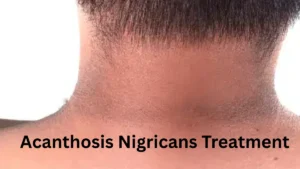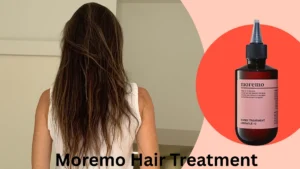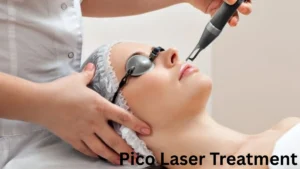Acanthosis Nigricans Treatment: Acanthosis nigricans is a common skin condition characterized by dark, velvety patches in body folds and creases—especially the neck, armpits, groin, and under the breasts. While not harmful on its own, it may be a warning sign of underlying health conditions like insulin resistance, diabetes, or hormonal imbalances.
In this 2025 guide, we explore the causes, diagnosis, and most effective treatment options for acanthosis nigricans, along with practical skincare tips and prevention strategies.
What Causes Acanthosis Nigricans?
Understanding the root cause is the first step to effective treatment. The most common triggers include:
Insulin Resistance and Prediabetes
Elevated insulin levels stimulate skin cells to multiply, leading to thickened and darkened patches. Acanthosis nigricans is often an early warning sign of prediabetes or Type 2 diabetes.
Obesity
Overweight individuals are more likely to experience insulin resistance, which can result in this skin condition.
Hormonal Disorders
Conditions such as polycystic ovary syndrome (PCOS), hypothyroidism, and adrenal gland disorders can also cause skin darkening.
Medications
Drugs such as corticosteroids, hormonal contraceptives, and niacin in high doses may trigger acanthosis nigricans.
Genetics
Some inherited forms of acanthosis nigricans are seen in children or adolescents.
Cancer (Rare)
In rare cases, sudden and severe skin changes may be linked to internal malignancies, particularly gastric cancer.
How Is Acanthosis Nigricans Diagnosed?
Your healthcare provider may:
- Visually examine the affected skin
- Perform a skin biopsy to rule out other conditions
- Order blood tests to check insulin levels, blood sugar, thyroid function, or hormone levels
- Recommend imaging tests if a cancerous cause is suspected
Medical Treatments: Tackling the Root Cause
Lifestyle Modifications
Losing weight, eating a balanced diet, and regular exercise can improve insulin sensitivity and reduce skin thickening.
Diabetes Management
Controlling blood sugar through medications, diet, and exercise is critical if acanthosis nigricans is linked to diabetes.
Medication Adjustments
If a certain drug is causing the condition, your doctor may switch you to an alternative.
Cancer Treatment
If related to a tumor, surgical removal or cancer treatment can reverse the skin changes.
Read more: Epidural Injection Price in UAE: What Expecting Mothers Should Know in 2025
Dermatological and Cosmetic Treatments
While these treatments don’t cure the condition, they can improve the skin’s appearance:
| Treatment | Purpose |
|---|---|
| Retinoids (e.g., tretinoin) | Promote exfoliation and skin renewal |
| Topical steroids | Reduce inflammation and itchiness |
| Vitamin D analogs | Normalize skin cell growth |
| Chemical peels | Remove dead skin and improve texture |
| Laser therapy | Lightens hyperpigmented patches |
| Antibiotic creams | Address odor or secondary infections |
Always use these under dermatological supervision.
Home Remedies and Skincare Tips
- Gentle exfoliation using mild scrubs
- Moisturizers containing urea or lactic acid
- Aloe vera or turmeric (patch-test before use)
- Daily sunscreen to prevent pigmentation from worsening
When to See a Doctor
Consult a dermatologist or endocrinologist if:
- The dark patches appear suddenly or spread rapidly
- The condition causes physical discomfort or psychological stress
- You have a family history of diabetes or hormonal disorders
- The skin changes are accompanied by other symptoms like weight loss or fatigue
Prevention and Long-Term Management
- Maintain a healthy weight
- Stay hydrated and eat low-sugar, low-carb foods
- Manage stress and sleep
- Get regular check-ups for blood sugar and hormone levels
Early diagnosis and treatment of acanthosis nigricans can prevent complications and improve both skin health and overall well-being.
Read more: PRP Hair Treatment Dubai 2025: 7 Proven Clinics for Natural Hair Regrowth
Medicines for Acanthosis Nigricans Treatment
| Category | Medicine Name | Purpose | How It Works |
|---|---|---|---|
| Insulin Sensitizers | Metformin | Treats insulin resistance (e.g., in diabetes, PCOS) | Lowers blood sugar and improves insulin sensitivity |
| Topical Retinoids | Tretinoin (Retino-A) | Skin lightening and exfoliation | Speeds up cell turnover and reduces skin thickening |
| Topical Steroids | Hydrocortisone, Clobetasol | Reduces inflammation and itching | Calms irritated skin and suppresses immune response |
| Vitamin D Analogues | Calcipotriol (Daivonex) | Regulates skin cell growth | Normalizes skin turnover rate |
| Oral Antibiotics | Clindamycin, Doxycycline | If bacterial infection or odor is present | Reduces bacterial load and inflammation |
| Chemical Exfoliants | Urea, Lactic Acid creams | Moisturizes and removes thickened skin | Softens keratin and promotes gentle exfoliation |
| Laser Therapy | (e.g., Nd:YAG, Fractional CO2) | Cosmetic treatment for skin texture and pigmentation | Lightens dark patches and reduces thickness |
FAQs About Acanthosis Nigricans
Can acanthosis nigricans go away completely?
If the underlying cause is addressed, skin discoloration may fade over time. However, it may not completely disappear.
Is it contagious or dangerous?
No, it is not contagious. While not dangerous on its own, it can indicate a serious underlying health condition.
Can children get acanthosis nigricans?
Yes, especially those with obesity or genetic predisposition.
Conclusion
Acanthosis nigricans is more than just a cosmetic skin issue—it’s often a sign of deeper health concerns. While the condition itself isn’t harmful, identifying and treating the root cause is key. With the right combination of lifestyle changes, medical treatment, and skincare, you can significantly reduce the appearance of acanthosis nigricans and improve your overall health.





